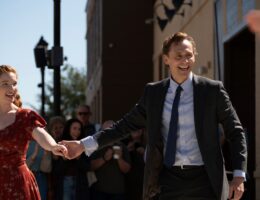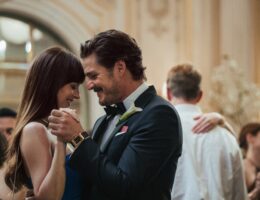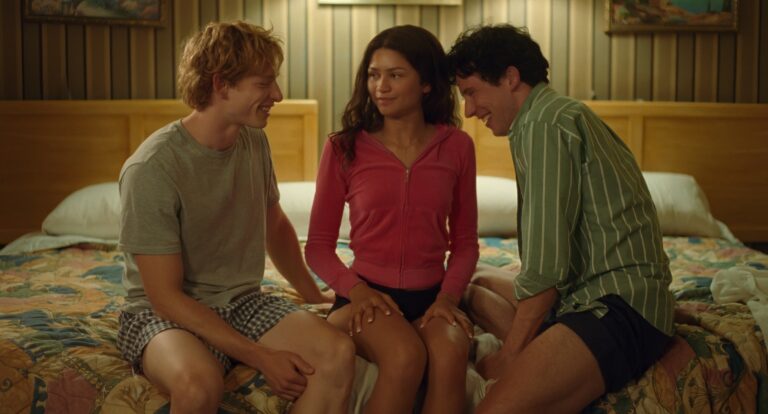Challengers (2024 | USA | | 131 minutes | Luca Guadagnino)
Luca Guadagnino has long explored the way our sexy human bodies drive us to madness, whether it’s a steamy countryside romance, the horror of an elite ballet academy, or the insatiable hunger for human flesh that motivates a cross-country road trip. With his latest, he transports us into the inner psychological warfare of the most dangerous game of all: men’s professional tennis. But, like David Foster Wallace’s Infinite Jest, Guadagnino’s Challengers isn’t really so much about what happens within the lines of a big green rectangle, but rather the passions that animate the game on either side of the net.
With the trio of young and ridiculously attractive actors – Zendaya, Mike Faist, and Josh O’Connor – whose scintillating chemistry burns the screen for over two sweaty hours, even audiences who notice the lack of high-level tennis authenticity won’t even think to object.1 As the film opens, we’re dropped into a torrent of chiseled bodies and copious perspiration, namely the finals of Phil’s Tire Town Challenger, a low-level professional tennis event in New Rochelle with a modest cash prize and a cheesy glass trophy etched with a charismatic rodent. Along with the assembled crowd, our heads will be swiveling in rapt attention for the duration of the match. Amidst the action, in his debut screenplay, playwright Justin Kuritzkes has the real story unfolding, Dunkirk-like, non-linearly across three timescales. Any given serve, passing shot, or game break can send us careening like a fuzzy yellow ball back and forth through time. As three intense sets play out over a sweltering summer afternoon, we volley between the game itself, the events of the prior week, and into the twelve-years of heady personal histories that set the stage for this long-overdue confrontation.
The prior week opens with Mike Faist as Art Donaldson, a top-ranked pro chasing the final piece of a Grand Slam (the US Open) to cap his illustrious career. Tashi Donaldson (Zendaya), with a notable scar on her knee that will be explained later, is his coach, advisor, substitute mommy, and wife (in approximately that order). He’s also recuperating from an injury; so when he flames out in the first round of a major, she convinces him to get back on the court by competing in the small stakes event as a way of begin to rebuilding his confidence.
When we jump back twelve years, we learn that Art used to be on the same side of the net as his present-day unknown opponent. As teens, he and Patrick Zweig (Josh O’Connor) were “Fire and Ice”, longtime bunkmates and star players at an elite tennis academy. We meet them in triumph as affectionate, inseparable doubles partners at the USTA Junior Nationals. They’re set to play each other the next day in the finals, but neither really seem to care about winning2 – at least not until they meet Tashi later that day. They’re horny rich boys; she’s the stunningly beautiful young champion who’s already ascended from working class roots to international celebrity with brand deals even before graduating high school. We watch them watch her play tennis and captivate a party, mouths agape, until they get up the nerve to talk to her, chat her up on a moonlit beach, and invite her back to their filthy hotel room. From the moment she shows up to interrupt their barely clothed3 sadly uneventful pre-bedtime chat and Y Tu Mamá Tambiéns them, it’s clear from her triumphant smile as she looks upon her handiwork with proud glee that she’ll be the driving force of the rest of their lives. From that moment forward we’ll watch her watch them and play chess with “her little white boys” as lover, coach, wife, and “home wrecker” — up close and from the sidelines — for the rest of the film. It’s a testament to Zendaya’s performance, Luca’s camerawork, and the Jonathan Anderson costuming that this seemingly secondary role uncontestedly holds the spotlight for the duration.
As we dip in and out of the unfolding decade, we’ll find out which boy got her number and witness the grotesque origin story of the scar on Tashi’s knee. There’s a lot of touchy-felt rambunctious male affection, a wardrobe of short shorts, and some suggestive sharing of churros destined to be this generation’s Lady and the Champ. The years sprawl with disappointment, soured and rekindled relationships, and career reboots. Conversations echo across the years, and wardrobe pieces hang around for the ride.4 In the nearer term we see how each of them ended up in New Rochelle. Perfectly-groomed Art and Tashi float effortlessly between high-end hotels5 and wear tastefully sponsored gear. Patrick rolls into town in a beat-up SUV with an ATM card that won’t even get him into a cheap motel, despite his most rakishly charming efforts. Instead, he curls up in the back seat and resorts to Tinder for tournament housing. Each fragment reveals and recontextualizes the high personal stakes of what the tennis world would see as a sub-meaningless game.
There’s plenty of intrigue, but the movie sizzles as one of the year’s most enjoyable purely on the energy of its stars. Guadagnino has a muse in Zendaya (who co-produced the film) and leans into her incredible physical presence at every turn. As if there’s any doubt to her magnetism, we see the boys melt into horny hypnotized spectators, heads rotating with every exchange from the moment they first lay eyes on her. The phenomenon is a constant. She portrays Tashi as a ferocious competitor who’s accustomed to captivating every space she enters. With every glance and decision, she conveys how pivoting from her own abbreviated career to being a relevant fixture at the highest levels still animates her. The boys lust after her, but the way the light goes out of her eyes whenever the subject turns away from tennis – or her understanding of it as more than a game – explains everything you need to know about the trio’s tumultuous history.
As for the guys, Mike Faist is unrecognizable from his scene-stealing turn as West Side Story’s bad boy Riff. Gingery blond Art’s on a roadmap that hits all the right marks: boarding school, prestigious college, an eventual rise through the ranks. In the present day, he’s a clean cut champion who wears his years of success as both armor and a burden. Despite a sense of quiet responsibility and dedication, his flagging confidence might be an early a manifestation of hearing the siren’s song of retirement. It’s tempting, but from the way he collapses in supplication to his wife, we instantly understand why he perseveres in the sport. Fresh off a dreamy performance in Alice Rorwacher’s wonderful La Chimera, Josh O’Connor’s Patrick is a rapscallion wonder who electrifies the whole film. He may not have sponsored apparel, but through big ears, shaggy hair, and scruffy disposition, he plays the character’s BDE as self-evident, in part because we’re assured that he has the big dick to back it up. From teenage phenom with a willfully nonconformist serve to a borderline successful pro with the same wonky serve, he’s perpetually comfortable in his own very handsome skin and at peace with being a dirtbag whose only skill is hitting a ball with a racquet rather than retreating to a life supported by his family’s fortune.
As these very sexy love triangles permute over more than a decade of barely suppressed homoeroticism, one of the most characters isn’t even on the screen. Instead, acting almost as a wordless narrator, is yet another banger original score from Trent Reznor and Atticus Ross. Whether it’s the romantic stirrings of attractions on a moonlit beach or the highly-stimulated heartbeats of lust or exertion, house beats and ravey synths crash into the middle of scenes, practically breaking the fourth wall. It indicates a reassuring sense that the movie is self-aware. It knows it’s jarring and titillating and toying with our patience; the pulsing soundtrack almost smirks at the joke and eggs it on to greater heights. It’s a tremendous effect that perfectly complements Sayombhu Mukdeeprom’s cinematography. Having previously collaborated with Guadagnino on Call Me By Your Name and Suspiria, he’s no stranger transmuting into film the feel of sultry summer longing and the spellbinding quality of perfect bodies in exertion or repose. Guadagnino is one of the great appreciators of great faces, rippling muscles, the verve of youth, and the lines of age. The storytelling is temporally fragmented and could induce whiplash, but the sounds and sights let you know that the jostling is all part of the ride.
The great game isn’t the one with racquets and balls, but the relationships between people playing them. Love, lust, loyalty, motivations, and control. Like so many of his movies, Guadagnino allows hours of barely suppressed tension to culminate in an explosion of near-surrealistic reshaping of their world. In this case, it’s a swirling windstorm that encompasses our characters and blows them headlong into a stand-up-and-cheer endgame. Early on, Tashi accuses the silly boys of believing tennis is a game when at its best it’s really a conversation. Curmudgeons might argue that the film overstays its welcome, but who says no to more time with three hot people driving each other out of their minds. You give the conversation time to run its course. Instead of rushing it, you film the final points of an breathtaking tennis match from the perspective of the ball, slow down time to capture the trajectory of every single milky drop of sweat pouring off the players’ bodies, and make the whole thing available to overwhelm with the power of pure celebrity magnetism on IMAX screens. Just as an epic game becomes legendary by going into overtime, this already entertaining movie ascends in its finale: it’s hot, horny, and just might cause motion sickness. We are, as they say, so back.
Challengers arrives in theaters on Friday April 26th.
Image courtesy Metro Goldwyn Mayer Pictures.
1. No offense to Brad Gilbert, the film’s tennis coordinator. The outline of his own pro career and history coaching Andre Agassi, Andy Murray, and Andy Roddick are all over the movie. And the tennis isn’t embarrassing, it is just clearly not the point and that’s OK.
2. In the first of many echoes between timelines, Patrick half-agrees to lose so Art’s grandmother can see him win, off-handedly mentioning that the junior singles champion usually ends up swirling around the lower eddies of the pro circuit.
3. From sexy to mundane, Luca loves bodies, what can we say?
4. Bless Patrick for hanging onto a stolen T-shirt and rocking the Killshots for more than a decade from pristine to filth. I felt incredibly seen. Even if his dedication to a meme shoe isn’t necessarily meant to be flattering, O’Connor is so rakishly charming in this movie I refuse to see the choice of kicks as anything but a glancing endorsement.
5. Their daughter likes them. And Spider-Verse. Good taste, this barely-seen kid.
6. He’s also later-bloomer who needed to (got to?) be taught how to jerk off by his roommate. It was the early-2000s, can you even imagine?




